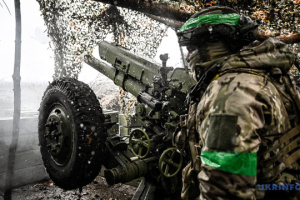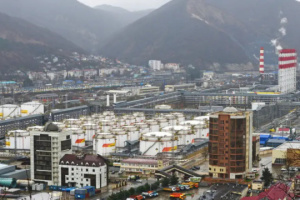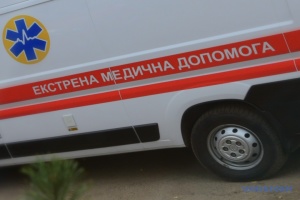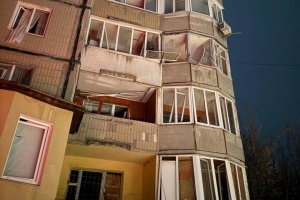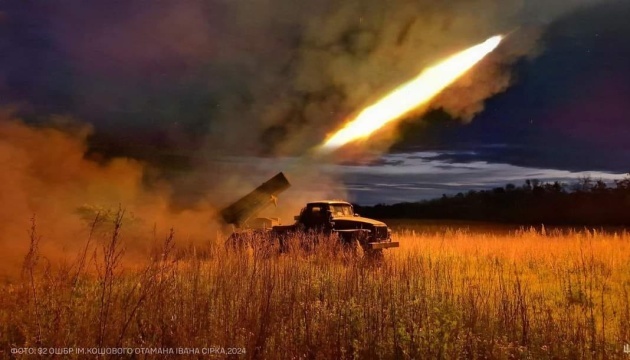
Ukraine Latest: Weekly Digest for September 30 - October 6, 2024
MAIN EVENTS OF THE WEEK
October 2: Ukraine's army has ordered troops in the mining town of Vuhledar in the eastern region of Donetsk to withdraw after two years of fighting.
"The higher command authorized a maneuver to withdraw units from Vuhledar in order to save personnel and military equipment, and take up a position for further operations,” the Khortytsia group of forces said in a statement October 2.
October 1:
Former Dutch Prime Minister Mark Rutte has officially taken over as NATO Secretary General. He was welcomed to NATO Headquarters in Brussels by the outgoing Secretary General Jens Stoltenberg, whose term ends after ten years.
Franko-German defense manufacturer KNDS has opened an office in Kyiv to help Ukraine carry out the domestic maintenance and repair of land systems and produce artillery ammunition, the company announced in a press statement released on October 1.
The Ukrainian subsidiary, to be known as KNDS Ukraine LLC, "will support the cooperation between Ukrainian government institutions, the Ukrainian armaments industry, and KNDS," the statement says.
KNDS makes around 800 systems used by or contracted for the Ukrainian Armed Forces, including the Caesar self-propelled howitzer, the Gepard self-propelled anti-aircraft gun tank, and the PzH 2000 armored howitzer.
The Parliamentary Assembly of the Council of Europe, in a resolution commemorating the 1930s Holodomor famine in Ukraine, voted to recognize the starvation of millions in Ukraine under Soviet leader Joseph Stalin as genocide of Ukrainians.
“PACE condemns Russia’s ongoing war of aggression against Ukraine, stressing the importance of upholding Council of Europe standards and calling for a united front to stop the aggression and achieve a peace which is comprehensive, just and lasting, ensuring that the rule of law prevails over the rule of force,” the resolution says.
The resolution also called on all parliaments of the Council of Europe member states and other parliaments to follow suit.
PACE emphasizes that Russia’s war of aggression in Ukraine must be considered in the context of the previous attempt to destroy the Ukrainian nation and consider it a new stage of Russia's genocidal policy.
THE WAR AS IT IS
September 30/ Shorts: Kushnir: The Russian army drops dozens of glide bombs on Toretsk every day
October 01/ Lakhno (aka Leleka): The society no longer notice military men, began living their own lives
October 01/ Shorts: Kushnir: How many more of their soldiers’ lives the Russian are ready to sacrifice?
October 02/ Voloshyn: Ukrainian forces were ordered to withdraw from Vuhledar in order to save personnel and equipment
October 03/ Shorts:_Khamets Revo: Equipment provided by partners helps effectively eliminate the enemy on the battlefield
September 30/ Final farewell and funeral for Maksym Kudrin, Kharkiv
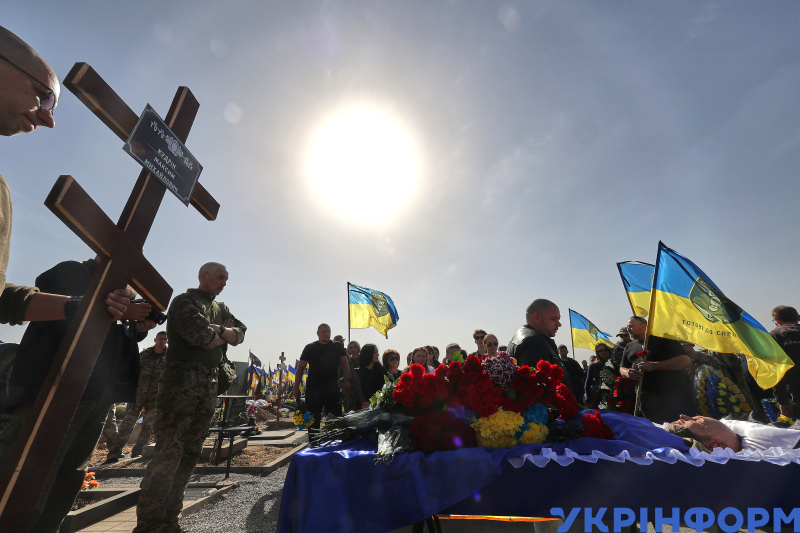
October 01/ The aftermath of Russia’s air raid on Zaporizhzhia city
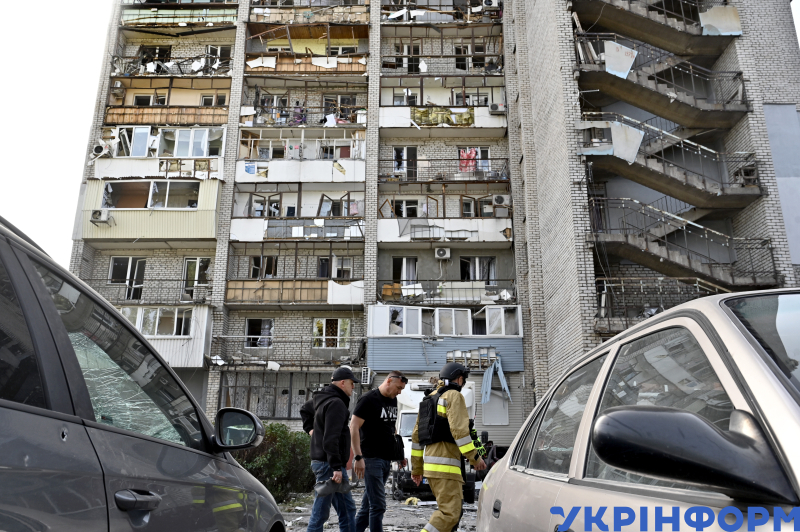
October 01/ A stamp honoring the Ukrainian Defenders’ Day was redeemed at a ceremony in Dnipro city
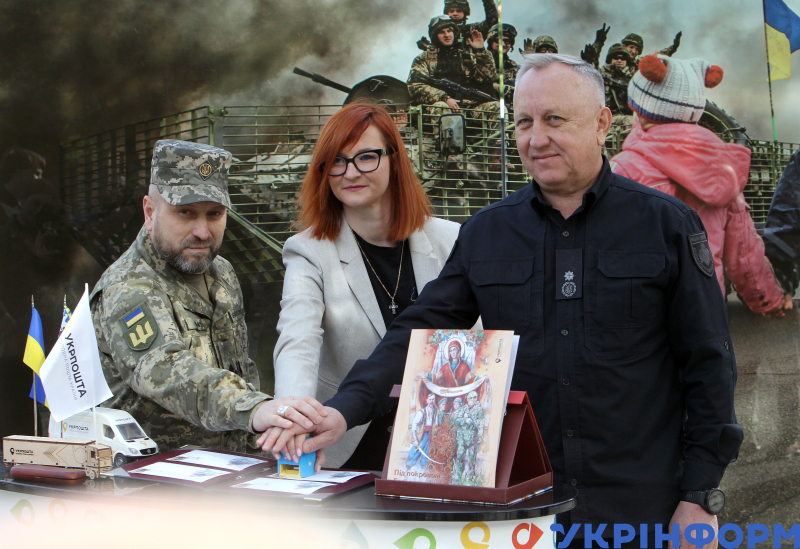
October 01/ A concert celebrating the Ukrainian Defenders’ Day took place in Lviv
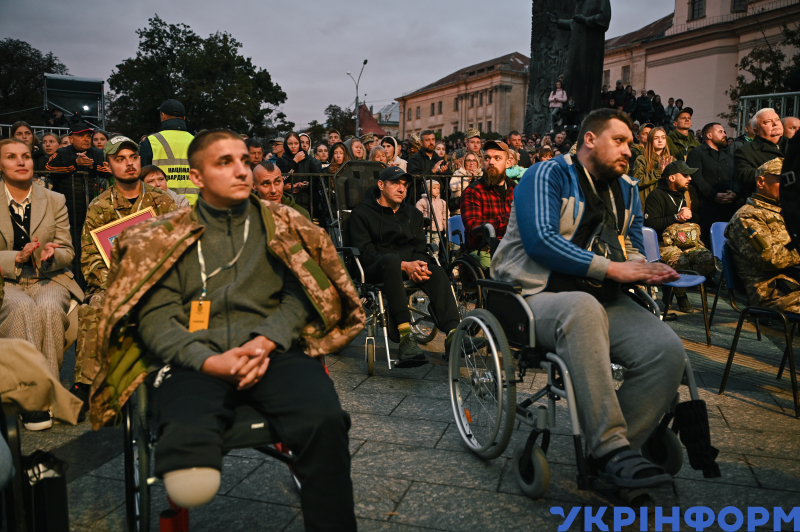
October 03/ This is how a high-rise apartment building in Kharkiv looks like after a Russian glide bomb hit
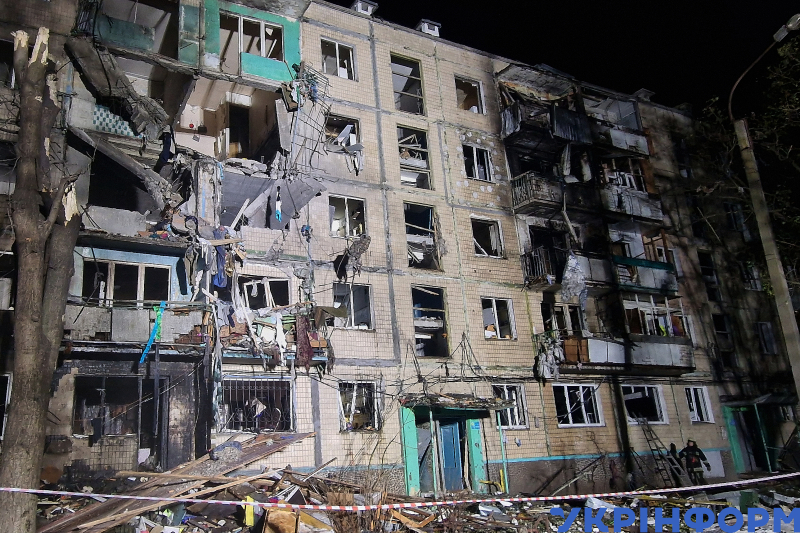
THE BATTLEFIELDS
Armed Forces Supreme Commander:
October 1: President Volodymyr Zelensky hosted a meeting at the Supreme Commander’s Headquarters to discuss the battlefield situation and preparations for the forthcoming Ramstein Format meeting with Defense Minister Rustem Umerov, Armed Forces Chief Commander Oleksandr Syrsky, and the Armed Forces Chief of Staff Anatoliy Barhylevych. Military intelligence chief Kyrylo Budanov reported intelligence about the goals and plans the Russian military command have for the remainder of the year.
While on a tour of the northeastern region of Sumy, President Zelensky chaired a meeting of the Supreme Commanders’ Staff, addressing energy infrastructure protection and air defense issues.
“The two key issues that are closely interrelated in this region, as in other frontline regions, are air defense and energy. I listened to reports from interim Air Force Commander Anatoliy Kryvonozhko and Chief of Air Command East, Ivan Terebukha on the measures the Air Force is taking to bolster the protection of Sumy oblast specifically, other border regions and the whole country," Zelensky said on Telegram Friday.
The President also met Ukrainian solders performing tasks in the Russian region of Kursk, and received a report from Colonel Dmytro Voloshyn, commander of the 82nd separate air assault brigade. In May 2024, the brigade halted Russian advance in the Kharkiv region. Since August, the brigade has been involved in operations in the Kursk region.
UKRAINIAN ATTACKS ON THE RUSSIAN FEDERATION
October 4: Hacker teams affiliated with Ukraine's Main Intelligence Directorate (HUR) deployed a wave of cyberattacks targeting several websites linked to the supply lines of the Russian army, a HUR source told Ukrinform.
In the aftermath of the attacks, Ukrainian hackers were able to infiltrate websites that provide support for Russia’s military logistics network and gather information on Russian forces’ movement. One of the most significant websites targeted was okrug.ru, which coordinates supplies of equipment and uniforms to the Russian military, particularly Land Forces, Airspace Forces, and Naval Forces.
In another successful attack, the website vashhotel.ru was hacked, which gave Ukraine access to data relating to the booking of accommodations for Russian military personnel across the country. Another equally important success was the hacking of Gostpatent.ru, which stores a database on registered patents - valuable information for Ukraine’s technical military intelligence.
All the Russian online resources targeted are providing support for Russia’s invading forces.
October 4: HUR’s hacker teams mounted a cyberattack targeting online platforms of Russia’s financial sector. The targets included Russian banks Alfa-Bank and Otkritie Bank, as well as Rostelecom, Russia's largest provider of digital services, which provide support for Russia’s war of aggression against Ukraine.
The attack caused a "global failure" in the rapid payment system, shutting down banks' mobile applications and online banking systems as well as the financial institutions' internal services.
October 3: Ukrainian launched drones struck the Borisoglebsk aviation center in western Russia’s Voronezh region in an overnight attack, Ukrainian media reported, citing security service sources.
The targeted facility stored glider bombs, Su-35 and Su-34 fighter jets, as well as aviation fuel.
“That’s where the enemy deploys guided aerial bombs against Ukrainian territories from,” a sources was quoted as saying.
Borisoglebsk is situated 300 kilometers (186 miles) from Ukraine border.
NASA satellite monitoring showed active fires at multiple locations in the town of Borisoglebsk, including one that matches that of the Borisoglebsk air base.
The Borisoglebsk aviation center and the nearby Chkalov aviation training center were targets for previous attacks staged by Ukraine’s Special Operations Forces and Security Service in August and April.
October 4: In the night hours, Ukrainian forces launched a drone attack targeting the Annanefteprodukt oil and products storage facility located near the village of Anna, Russia’s Voronezh Oblast, Ukraine's General Staff reported.
The oil storage facility housed 20 tanks with fuel and lubricants.
"It was confirmed that at least one of the vertical tanks was hit," the General Staff said.
Alexander Gusev, the Voronezh Oblast governor, claimed that an empty tank at an oil storage site was hit in the drone attack.
HOSTILITIES
October 5: Ukrainian defense forces hit three Russian command posts using Western-supplied Storm Shadow missiles and GMLRS rockets, as per report from Ukraine Armed Forces General Staff.
The attacks struck the command posts of the 35th and 27th separate motor rifle brigades, as well as that of the 2nd Combined Arms Army of the Russian Armed Forces, the General Staff said in a post on Telegram.
It did not specify the locations of the strikes or the dates on which they were carried out, only saying they happened "the other day."
"The aftermath of the strikes is being verified," the post said, adding: "The attack was carried out using Storm Shadow missiles and GMLRS rockets”.
October 5: A rare Sukhoi S-70 Okhotnik—the Russian air force’s first stealthy armed drone – got shot down, purportedly by an accompanying Russian fighter after the drone seemingly malfunctioned near the Ukrainian-held fortress town of Chasiv Yar in eastern Ukraine.
The wreckage rained down on nearby Kostyantynivka, which is currently controlled by Ukrainian forces. Imagery from the crash site offers a tantalizing hint at what the 65-foot-wingspan, subsonic S-70 was doing over the eastern front line.
Amid the scorched drone parts were apparent components of a D-30SN precision glide bomb. That strongly implies the Okhotnik was flying a bombing sortie when it was shot down.
In the period between September 30 and October 6, the enemy increased the intensity of its operations along the Kharkiv axis. The Ukrainian Defense Forces are containing the Russian onslaught.
In Vovchansk town, the enemy was reinforcing its assault capabilities with additional personnel, with focus on UAV and artillery units.
The Bureviy (Storm) Brigade from the National Guard’s Guard of Offense unit, acting in a coordinated effort with other Defense Forces units, successfully repelled an enemy assault on the Kharkiv front. The invading forces deployed over five dozen heavy armored vehicles for this attack, the Ministry of Internal Affairs reported.
October 1: Soldiers from the Tavria 79th Separate Air Assault Brigade successfully fended off a massive Russian attack in the Donetsk region. In this intense engagement, the Russians attempted to breach through Ukrainian defenses with 19 armored vehicles, including tanks.
Near the village of Kostyantynivka, which is located along the Kurakhove axis, the Russians sent 11 armored infantry fighting vehicles into battle, reinforced by eight tanks. The advancing column of Russian vehicles was promptly identified and subjected to lethal fire. Ukrainian forces deployed artillery guns, explosive drones, and aerial drops from quadcopters to repel this attack, having hit four tanks and two IFV vehicles.
October 3
The Ukrainian military stalled Russian advance on Pokrovsk, Donetsk region.
In Russia’s Kursk region, the Russian military faltered in their counteroffensive at the settlement of Lyubimovka, which is currently held by Ukrainian forces.
North Korean service members were killed and injured near Russian occupied Donetsk.
A team of North Korean military arrived in the Russian-held part of Donetsk oblast to exchange experience with their Russian counterparts.
In the aftermath of a missile strike, more than 20 personnel died, among them six officers from North Korea.
Ukrainian forces have struck a valuable Russian radar station using U.S.-supplied long-range missiles, in an attack that could disrupt Moscow's air defenses and open up Russian targets to further attacks using sophisticated Western weapons.
Ukraine destroyed a Russian Nebo-M long-range radar station in an unspecified location, purportedly using US-supplied ATACMS ballistic missiles. "The destruction of this asset significantly reduces the ability of the Russian army to detect, track and intercept aerodynamic and ballistic targets," Ukraine's military said.
Ukraine has received more than one-third of the 500,000 155 mm shells expected to be delivered under the Czech-led initiative by the end of 2024.
The initiative had raised funds to buy 500,000 rounds of ammunition for Ukraine, and hopes to finance 300,000 more by the end of 2024. Eighteen countries have committed to the initial initiative, with 15 having fulfilled their commitments and provided the funds.
Czechia unveiled its initiative to purchase artillery shells for Ukraine jointly with partners earlier this year amid shell shortages caused mainly by delays in U.S. assistance.
Prague is planning a new initiative to purchase artillery ammunition for Ukraine in 2025.
October 4: Russian forces are less than 7 kilometers (4 miles) from the outskirts of the town of Pokrovsk in Donetsk Oblast as of Oct. 4, said Serhii Dobriak, the head of military administration for Pokrovsk.
The eastern front near Pokrovsk has been the scene of fierce fighting for several months and a focal point of Russia's offensive in Donetsk Oblast. The city is an important logistical hub for Ukrainian forces.
Dobriak, speaking in a televised appearance, said that Russia attacked civilian infrastructure in Pokrovsk with precision glide bombs a day earlier, injuring people.
"(Critical infrastructure) is damaged or destroyed by almost 80%. The enemy leaves us without electricity, water, and gas," he added.
THE WEEK IN NUMBERS AND PICTURES
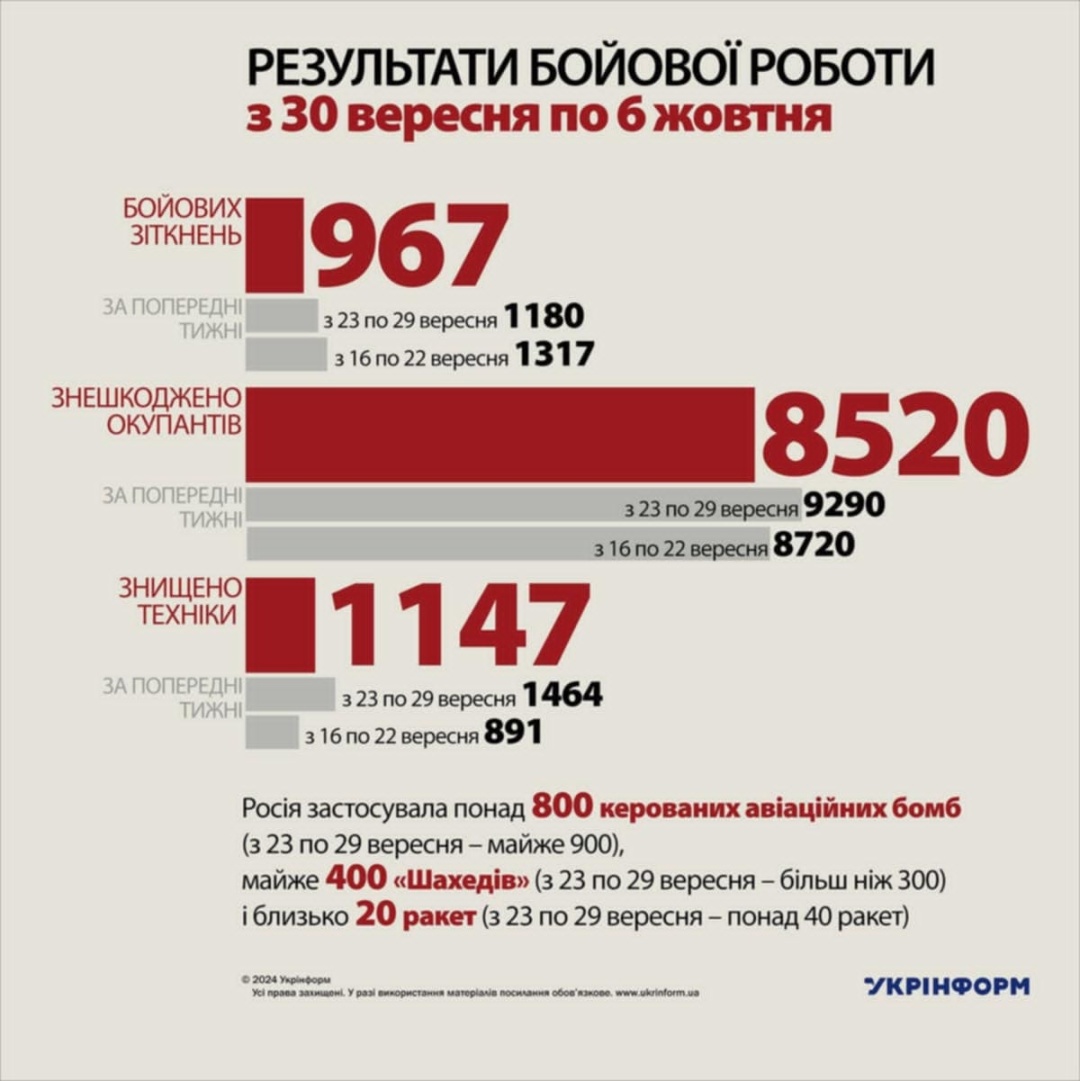
In the period between September 30 and October 6, Ukrainian Air Defense Forces shot down 254 out of 361 Shahed-131/136 explosive drones Russia deployed against Ukraine over the week under review. Of the 361 drones launched, 18 were defeated with EW countermeasures and crashed in several different regions in Ukraine, four were diverted back to the Russian Federation, and two others flew across the border into Belarus.
The attacks inflicted damage on civilian and energy infrastructure assets in the regions of Odesa, Kirovohrad, Dnipropetrovsk, Sumy, Mykolaiv, and Kyiv regions; leaving six civilians injured.
Russian air attacks on Donetsk, Kherson, Zaporizhzhia, Sumy, and Kharkiv regions killed 33 people and injured 128 others over the week under review.
RUSSIAN AIR RAIDS ON UKRAINE
October 2: A precision glide bomb launched by Russian military on a high-rise apartment building in Kharkiv city in early night hours injured 12 people, among them a three-year-old girl.
Russian military deployed one-way attack drones targeting a neighborhood in the Koryukiv District, Chernihiv oblast, killing three people, among them a six-year-old child, and injuring four others.
October 6: Russia deployed an Iskander-M missile to hit a dry cargo ship in the seaport of Odesa, damaging a gas pipeline and killing a Ukrainian man.
WAR CRIMES
At least 177 Ukrainian prisoners of war have died in Russian captivity over the time of Russia's full-scale invasion of Ukraine.
The prosecutor's office has launched a pre-trial investigation in connection with media reports on October 1 that Russian soldiers had shot and killed 16 armless Ukrainian servicemen.
Russian soldiers executed four Ukrainian troops they had captured at an aggregate plant in Vovchansk town, Kharkiv region, some time in the summer 2024.
UKRAINIAN HOME FRONT
President Volodymyr Zelensky:
Will set out a Victory Plan to the forthcoming Ramstein Format meeting, specifying explicit, concrete steps to be made to achieve a fair end to the war;
held a meeting with top managers of the world's leading defense manufacturers on the margins of the second edition of the International Defense Industries Forum;
on the Ukrainian Defenders’ Day, conferred posthumously the title Hero of Ukraine to Air Force pilot Andrii Pilshchikov, aka Juice, who died in a plane crash over Zhytomyr oblast on August 25.
***
VISITS TO UKRAINE
October 2: The Administrator of the US Agency for International Development (USAID) Samantha Power arrived in Kyiv to reaffirm the United States' support for Ukraine. This is Administrator Power's third visit since the start of Russia's full-scale invasion in 2022.
October 3: During his maiden trip as NATO Secretary General, Mark Rutte visited Kyiv on Thursday. The Secretary General met with the President of Ukraine, Volodymyr Zelensky to pledge continued support for Ukraine in its war with Russia, and said that Ukraine is closer to NATO than ever.
***
Ukraine is looking to produce 1.5 million UAVs by early next year.
CABINET OF MINISTERS
allowed military unit commanders to recruit volunteers by themselves, bypassing military enlistment authorities;
dismissed Stanislav Heyde as deputy Defense Minister;
dismissed Lyudmyla Darahan as State Secretary at the Ministry for Education and Culture;
earmarked UAH 2.548 billion from a grant aid provided by the Japan International Cooperation Agency (JICA) to support Ukraine’s emergency recovery and reconstruction programs in the energy, security and infrastructure sectors;
amended the Procedures for Conscription of Citizens for Military Service during Mobilization Period, shortening the time limit for citizens to show up at a military enlistment office, depending on the place of residence. Starting October 1, citizens residing in regional capitals must show up within 7 days, and in places other than regional capitals -- within 10 days after the receipt of the summon.
MINISTRY OF DEFENSE
Ukraine is focusing its efforts on production of missiles and UAVs, is set to announce a major national missile program;
Over the period from January to September 2024, more than 900 weapons products and systems have been certified and authorized for use by the country’s Armed Forces, including over 600 products of the Ukrainian make;
On the sidelines of the second edition of the International Defense Industries Forum in Kyiv (DFNC2), Ukrainian Defense Industry JSC inked cooperation deals with arms manufacturing companies from the USA, France and Poland.
Deputy Minister of Defense Dmytro Klymenkov showcased to foreign partners the latest products by Ukrainian defense industries, which have already proved to be highly effective on the battlefield. Among the products showcased were the anti-tank missile system Stugna, a towed version of the 2S22 Bohdana self-propelled howitzer, different armored vehicles, ground kamikaze drones, mine action vehicles, and unmanned aerial vehicles.
The head of the Ukrainian Institute of National Remembrance, Anton Drobovych has requested the Cabinet of Ministers to provide at least UAH 1 million for a field research into Volyn massacre, in particular, based on requests from Polish citizens.
The Ministry of Internal Affairs has already set up 750 invincibility stations (where people can come to get warm, charge their phones, have a cup of tea or collect a ration pack), and is ready to deploy 450 more if needed.
Within the two months following the launch of the Army+ app, 300,000 service members have registered, and more than 1,000 military units have submitted and adopted electronic reporting.
UKRAINIAN ECONOMY AMID WAR
If temperatures fall below minus 10-15 degrees Celsius, shutdown schedules can be introduced in the morning and evening hours. If the winter is warm, Ukraine will be able to go through the heating season without power outages.
On October 1, the first 16 online auctions for the sublease of state-owned agricultural land took place as part of Land Bank project being implemented within the Prozorro e-procurement system. The total value of winning bids amounted to UAH 35.4 million (plus VAT), which will replenish the state budget.
Ukraine had injected 12.4 billion cubic meters of natural gas into its underground storage facilities as of October 1, 2024.
Over the time of the all-out war, the National Bank of Ukraine (NBU) has allocated almost UAH 37.3 billion (including UAH 1.9 billion allocated in September 2024) in funding for the country’s defense needs. The NBU opened a fundrising account to support the Ukrainian defense forces in February 2022. The money has been coming in from individuals and businesses in Ukraine and elsewhere, including the United States, the United Kingdom, Germany, Sweden, Finland, Poland, Switzerland, Norway, Australia, France, Canada, Bulgaria, and Hong Kong, just to name a few.
Consumer prices grew by 4.9 percent over the first eight months of 2024.
From January to September 2024, Ukrainian seaports handled 74 million tons of cargo year-on-year, compared to 41.1 million tons of cargo processed over the same period last year.
WAR AFTERMATH
Human losses
Since 2014, Russia has killed 96 journalists and other media professionals in Ukraine, among them 69 those who died defending Ukraine - Institute of Mass Information.
Over the three summer months of 2024, 589 civilians died and 2,685 others were injured in the aftermath of Russia’s war of aggression in Ukraine, which represents a 45 percent growth over three previous months.
Over the time of the all-out Russian war, 1,041 civilians, among them almost one hundred minors have suffered injuries caused by land mines and other explosive hazards.
ENVIRONMENT
Almost 17 hectares of forests in the regions of Kharkiv and Poltava have burnt out in the aftermath of Russian bombardment attacks - Slobozhanske Forestry Office.
Russia has committed more than 4,700 crimes against the environment in Ukraine, inflicting a damage worth $64 billion and causing contamination of soil, water, and air.
In Ukraine, 128,000 sq. km of land and 14,000 square km of water area are contaminated with explosive ordnance or mines due to Russia’s war of aggression.
CULTURE
Cultural values stolen by Russian troops from Ukraine began to be offered for sale on the international black market.
A total of 1,169 objects of cultural heritage in Ukraine have sustained damage due to the Russian invasion beginning in February 2022, among them 22 objects damaged over September.
ECONOMY
In Russia occupied Kherson Oblast, the invaders are destroying the State Enterprise "Pilot Farm "Askaniiske". The Farm’s unique beef cattle herd were either taken away to Russian territory or are destined to become meat. This will be a disaster for the breeding of cow breeds, because the Askaniiske Farm was once ranked among the best in Ukraine.
Northern Donetsk region will remain without water supply for an indefinite period due to massive Russian bombardments.
An external overhead line that supplies power from Ukraine's energy grid to the Russian-held Zaporizhzhia Nuclear Power Plant (ZNPP) in the city of Enerhodar remained disconnected during 36 hours this week after Russian attacks, causing disruptions in power supply needed to cool six reactors and for other critical nuclear safety functions, the state nuclear energy company Energoatom said in a press report.
It warns that “The loss of external power supply to the pumps that cool the reactor cores and fuel pools at the power plant can cause an emergency".
The Zaporizhzhia NPP, the largest nuclear plant in Europe, has been under Russian control since March 2022. Throughout that time, the plant has been repeatedly disconnected from the Ukrainian power grid due to Russian attacks, having experienced eight complete blackouts and a partial one when emergency diesel generators and safety systems were activated.
Russian bombardments damaged or destroyed to rubble more than 30,000 civilian buildings and facilities in the Kherson region. The residential sector is the worst affected, accounting for some 95 percent of the total number of the objects damaged or destroyed, among them 27,600 private houses and 1,200 high-rise apartment buildings.
HEALTHCARE
In Ivano-Frankivsk, the requirement for soldier rehabilitation treatment has surged nearly ten-fold; currently, 40 soldiers undergo the treatment on each particular day, the requirement being almost ten times higher than that.
WAR&LIFE
October 01/ Radio "Aphrodite": Love and power of the UPA radio station
QUOTE: "Vigilant and patient" listeners, not only abroad, and especially not abroad, but in Ukraine, waited for the daily broadcasts of the UPA underground radio station, which once again found itself in between two occupations - the Soviet and the German. Unfortunately, there were other "vigilant and patient - German and Soviet ears who hunted for call signs, unable to spot this mysterious Aphrodite for a long while."
October 02/ Ruslan Martsynkiv, Ivano-Frankivsk City Mayor: Language is one of the issues that must be raised for the sake of saving the State and the nation.
QUOTE: "..The issue of building a rehabilitation center is acute for the city. In our Central City Hospital, about 40 soldiers undergo rehabilitation treatment every day, while the current requirement is for nearly 400. That is, the need for rehabilitation treatment has surged almost 10 times."
October 04/ Withdrawal from Vuhledar: an indispensable move, the frontline has not collapsed. Russian dropped KAB bombs must be done away with.
QUOTE: "The head of the Center for Military and Legal Studies, Oleksandr Musienko: the loss of Vuhledar is not a disaster for the Ukrainian forces: "Facing the risk of falling into a propaganda trap the Russians could play out by capturing our soldiers, the appropriate decision was taken – to leave the town; I fully agree with President Zelensky's words that what matters the most is saving soldiers’ lives".
October 06/ A school teacher from Kharkiv region: They promised a "green" corridor. They let people go, then shoot at them.
QUOTE: “They said they would give a 'green' corridor. They let people go, then were shooting at them. We still were able to drive through – reached rows of landmines, got out of the vehicles and moved on to ours... A drone was constantly flying overhead. Attack! Four of us, including a couple’s dog, sheltered in a dugout. It was tight, the dog tried to hide between us, we covered his ears at the sounds of shots and explosions... It did not subside, explosions were blowing nearby, clods of clay were falling onto our heads. It seemed to have calmed down. It started raining. And they started to shoot again."
AID FROM ALLIES AND PARTNERS
Ukrainian Ministry of Foreign Affairs released a comment where its spokesman denied a report by The Financial Times saying that Ukrainian Foreign Minister Andrii Sybiha, at private meetings on the sidelines of the UN General Assembly in New York, was allegedly discussing a territory-for-peace swap with Russia.
“On the contrary, the minister’s position is unwavering, and he repeated it behind closed doors: there can be no compromises on Ukraine’s sovereignty and territorial integrity. The peace formula is the only realistic path to a comprehensive, just, and lasting peace. The principle of 'Nothing about Ukraine without Ukraine' must be strictly upheld, Heorhii Tykhii said in a comment.
The United States has reviewed Ukraine's victory plan and identified "a number of productive steps," U.S. State Department spokesperson Matthew Miller said at an Oct. 2 briefing.
President Volodymyr Zelensky presented the five-point to U.S. President Joe Biden at the White House on Sept. 26 and discussed it with presidential candidates Donald Trump and Kamala Harris, as well as members of Congress.
"The victory plan that Ukraine presented is not just a question of actions that Ukraine would take. It’s a question of actions that other countries around the world would take as well," Miller said.
The plan includes military and diplomatic elements, such as Ukraine’s bid to join NATO, though the full details of the peace framework have not been made public. Kyiv says the goal is to bolster Ukraine’s negotiating position and pressure Russia into agreeing to a just peace.
October 1: The Parliamentary Assembly of the Council of Europe (PACE) adopted a resolution addressing issues of propaganda and freedom of information in Europe. The resolutions calls for sanctions against Russian propagandists and recognizes the Russian Orthodox Church as an instrument of influence.
The resolution has it that the Parliamentary Assembly is concerned about the widespread dissemination of propaganda aimed at the formation of a biased public opinion, threatening the proper functioning of democratic systems, and jeopardizing shared values and human dignity.
"This harmful propaganda includes both illegal propaganda and propaganda that, while not prohibited, can harm the development of free thought and informed citizen participation in public debates and decision-making through unethical communication methods, including disinformation and psychological manipulation tools", says the resolution.
October 3:
A battery of Patriot air defense system donated by Romania arrived in Ukraine.
The US Department of Defense said that NATO would not intercept missiles and drones over Ukraine in the same manner as it does over Israel, citing significant differences in the landscapes and battlefields.
Pentagon Deputy Spokesperson Sabrina Singh said during a briefing that these are “two very different landscapes and battlefields.”
When questioned about shooting down hostile targets from Polish or Romanian territory, Singh replied that it would draw Western countries into the conflict.
"That would be involving us in a war in a different way. Right now, we feel that Ukraine has been able to successfully defend against Russian strikes on their cities, their populations, and their infrastructure. And we're going to continue to make sure that they have the support that they need to do that”.
The US Department of Defense has awarded a $6.9 billion contract to Boeing to manufacture small-caliber bombs, which will include supplies for Ukraine.
The allocated funds will facilitate the production of these bombs for Bulgaria, Ukraine, and Japan.
French-German Group KNDS signed a deal to sell 12 Caesar self-propelled howitzers to Ukraine, as announced by French Defense Minister Sebastien Lecornu.
The news came days after KNDS announced it had opened an office in Kyiv to help Ukraine carry out the domestic maintenance and repair of land systems and produce artillery ammunition.
France has supplied Ukraine with dozens of Caesar howitzers, a self-propelled artillery system capable of hitting targets up to 55 kilometers (34 miles) away.
Training of a new group of Ukrainian pilots on F-16 fighter jets in the USA will be scheduled and launched after they have completed language training.
That’s according to DoD assistant spokesperson Sabrina Singh, who commented on the expected time frame for such pilot training
One of the requirements for pilot training is good command of the English language, she said, and added that, as soon as Ukrainian pilots are ready in this respect, they can proceed to training on the F-16.
Finnish member of the European Parliament (MEP) Pekka Toveri has been elected as the new chair of the EU-Ukraine Parliamentary Association Committee, a key instrument for cooperation between the European Parliament and the Verkhovna Rada of Ukraine - Yle.
The Romanian Parliament has endorsed a proposal by President Klaus Iohannis to set up a training center in Romania to train Ukrainian marines.
“The training centre will position Romania as a regional leader in training for marine operations by helping to increase cohesion, demonstrate unity, and strengthen Euro-Atlantic deterrence and defense”, President Iohannis said in relevant letter of request to Parliament.
The United States Agency for International Development (USAID) has committed over $1 billion in new assistance to Ukraine, encompassing energy support, humanitarian aid, and educational resources, USAID Administrator Samantha Power announced these commitments during her visit to Kyiv on 2 October.
Samantha Power revealed that USAID is allocating $825 million to bolster Ukraine’s energy security this winter, nearly doubling last year’s investment.
Croatian President Zoran Milanovic has refused to approve the participation of Croatian soldiers in NATO's mission to support Ukraine, citing concerns about the conflict potentially spreading to Croatia and prioritizing the safety of his own country.
This decision contradicts the support package agreed upon at the July NATO summit, which included establishing the NATO Security Assistance and Training for Ukraine (NSATU) to coordinate military aid and training for Ukraine by partners.
The aim of NSATU is to support the transformation of Ukraine's Defense and Security Forces, ensuring further integration with NATO.
Luxembourg became the 17th partner country to join the Drone Capability Coalition for Ukraine, created within the Ramstein format - the Ministry of Defense.
Switzerland has committed to earmark 1.5 billion Swiss francs (aprox. $1.7 billion) to support recovery and reconstruction projects in Ukraine over the next four years, Swiss Ambassador to Ukraine and Moldova Felix Baumann said.
One billion of the funds will be allocated to the Ukrainian sectors of self-government, demining, and humanitarian aid. The rest of the money will be used for recovery programs involving the Swiss private sector.
Lithuania’s parliament passed a resolution designating Iran’s Islamic Revolutionary Guard Corps (IRGC) as a terrorist organisation.
The resolution calls on the EU to follow the lead of the United States and Canada and include the IRGC on the bloc’s list of terrorist organisations.
Compiled by Marina Dmytriv

